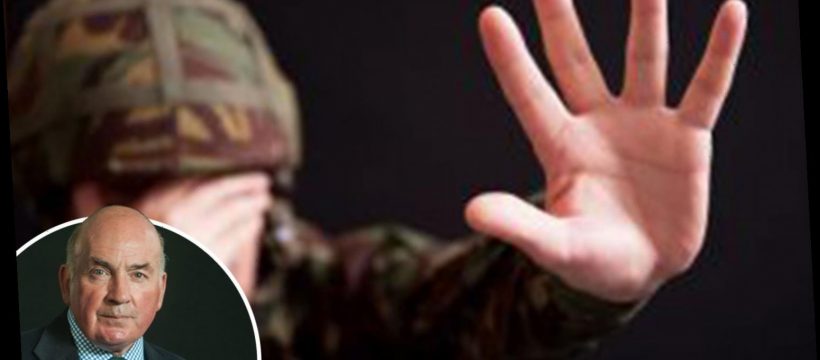COMMON sense and natural justice have prevailed in the Ministry of Defence at last and the witch hunt of soldiers accused of wrongdoing in Iraq is now finally over.
When Andrew Cayley of the Service Prosecuting Authority said it was now “quite possible” none of the allegations would lead to criminal charges, he knew what he was talking about. He and I worked together in The Hague on the prosecution of the Serb Generals Mladic and Krstic over the Srebrenica massacre in 1995.
They were both duly convicted and imprisoned with long sentences – that was justice properly applied, not the ludicrous allegations of struck off lawyer, Phil Shiner, or the mendacious work of the grotesquely expensive Iraq Historic Allegations Team.
Well done to Defence Secretary Sir Michael Fallon for stopping IHAT in 2017 and now to the present Defence Secretary, Ben Wallace, for finally killing off that most damaging process.
Why would any sensible young person think of putting on the Queen’s uniform if they thought they could be tapped on the shoulder years after an operation and questioned over false allegations?
No one is above the Law, soldiers included, but their employer, the Ministry of Defence, must exercise its duty of care to its people responsibly and never again allow wholesale unfounded allegations to be made.
And so, to the Troubles in Northern Ireland around which the spectre of a knock on the door by police asking questions about incidents 30 or 40 years ago still lingers on for former British soldiers.
Ex-Household Cavalry soldier, Dennis Hutchings, is standing trial for attempted murder in the High Court in connection with the killing of a civilian in Northern Ireland in 1974.
I have a copy of the letter from the Army Legal Services at the time informing him that, following a police investigation, the Director of Public Prosecutions had “directed that there is to be no prosecution of any military personnel” arising from this tragic event.
Families of the bereaved have the right to know what happened to their loved ones but not at the expense of stress and worry to 60 and 70-year-old former soldiers.
Yet today, with no new evidence being presented against Dennis Hutchings, this 79-year-old veteran with end-stage renal failure must listen in by video-link while a single judge decides his case.
When Dennis said the other day: “To say that I’m disappointed in our legal system would be choosing my words carefully”. That is a very polite understatement by a most loyal ex-soldier. Where, on the other hand, is the Government’s loyalty to him?
Dennis Hutching’s case clearly illustrates the disproportionate attention being paid to soldiers and former soldiers arising from their service in Northern Ireland. During the Troubles, around 3,500 people were killed in the Province and very many more injured.
Reliable statistics show that 90% of the deaths were caused by terrorists (60% by Republican paramilitaries and 30% by Loyalist paramilitaries).
Less than 10 per cent of those who were killed between 1969 and 2009 were at the hands of the police and the military and of these, with a handful of exceptions, all were found to be lawful.
There is no getting away from the fact that the vast majority of soldiers in Northern Ireland got up in the morning with a clear aim to abide by the Law and fulfil their duties with integrity.
Terrorists, on the other hand, got up in the morning with the clear aim to kill and to maim, for purely political purposes.
So, what is to be done? Accepting that no one is above the Law and that where credible allegations, backed by evidence, are made against anyone, then charges must be laid, a case heard in court and a proper finding reached.
This applies to soldiers and to civilians alike. And there are still unexplained deaths in Northern Ireland. But for investigations to focus unduly on former soldiers is grossly unfair. The British Army kept detailed records of who was where, doing what on a given date.
None of the paramilitaries, the IRA nor the UVF or UDA, kept such records, so starting with inquiries first to soldiers, while logical to the police mind, is thoroughly unreasonable and very worrying, if done in the wrong way with an unexpected knock on the door.
It is for that reason that the former Attorney General, Geoffrey Cox MP, proposed that such questioning should be on the presumption not to prosecute. In this way soldiers can be invited to provide information but without the fear that they will incriminate themselves or their comrades.
Families of the bereaved have the right to know what happened to their loved ones but not at the expense of stress and worry to 60 and 70-year-old former soldiers. That offends natural justice and must stop.
On my last morning as Chief of the General Staff on 28th August 2009, two investigators presented themselves in my office in the Ministry of Defence to ask about a death in Belfast in 1973. This was nothing more than a fishing trip and quite unacceptable.
In the United Kingdom, we are justifiably proud of our soldiers, sailors, airmen and marines. They take risks on the front line to protect our national interests and citizens at home and abroad.
They are trained to follow core values of selfless commitment, courage, discipline, integrity, loyalty and respect for others. They go about their duties with these values very much in mind.
They deserve the respect of the country and the support of the elected Government of the day whose operations they conduct on behalf of the people. They do not deserve to be accused and harassed years later.
I am delighted that the appalling IHAT is now itself part of history, so too must be the witch hunt of former soldiers who did their duty in Northern Ireland. The Prime Minister has pledged to act – now is the time.
Source: Read Full Article


